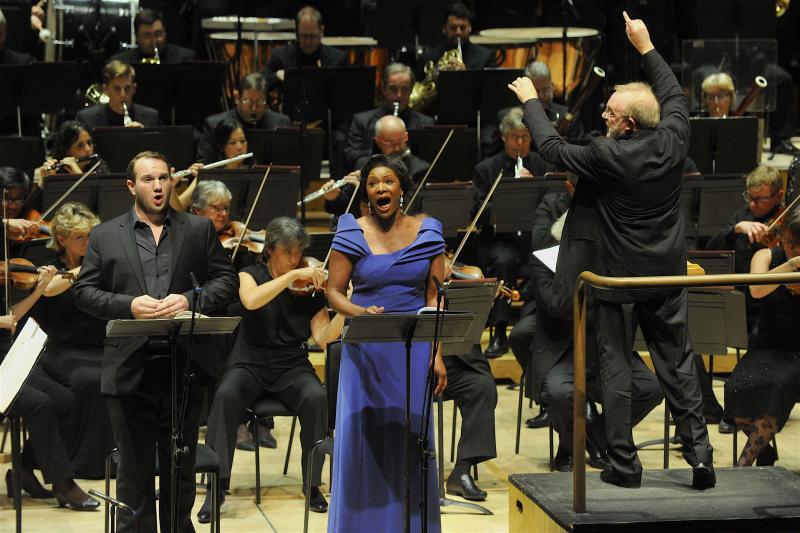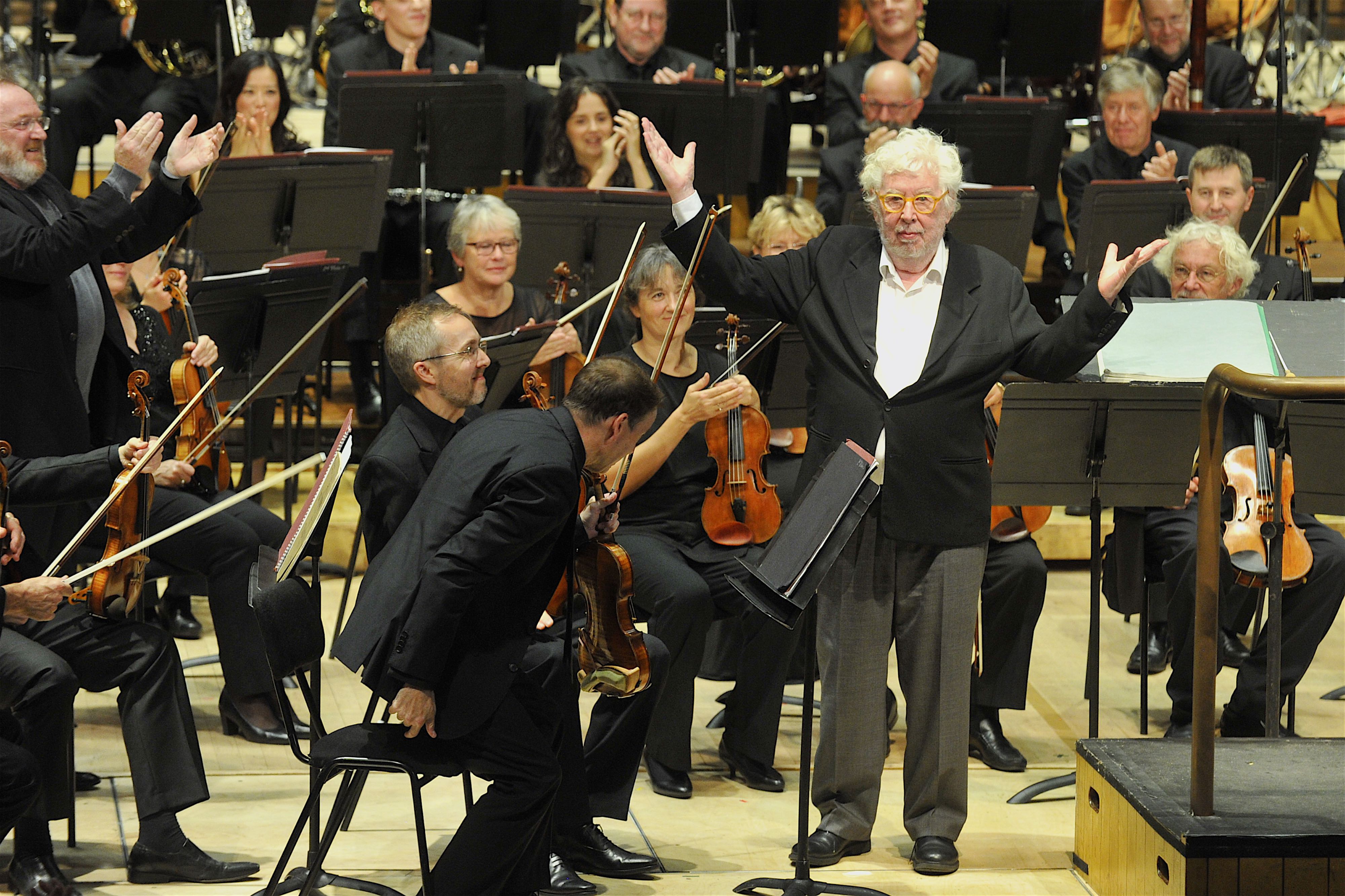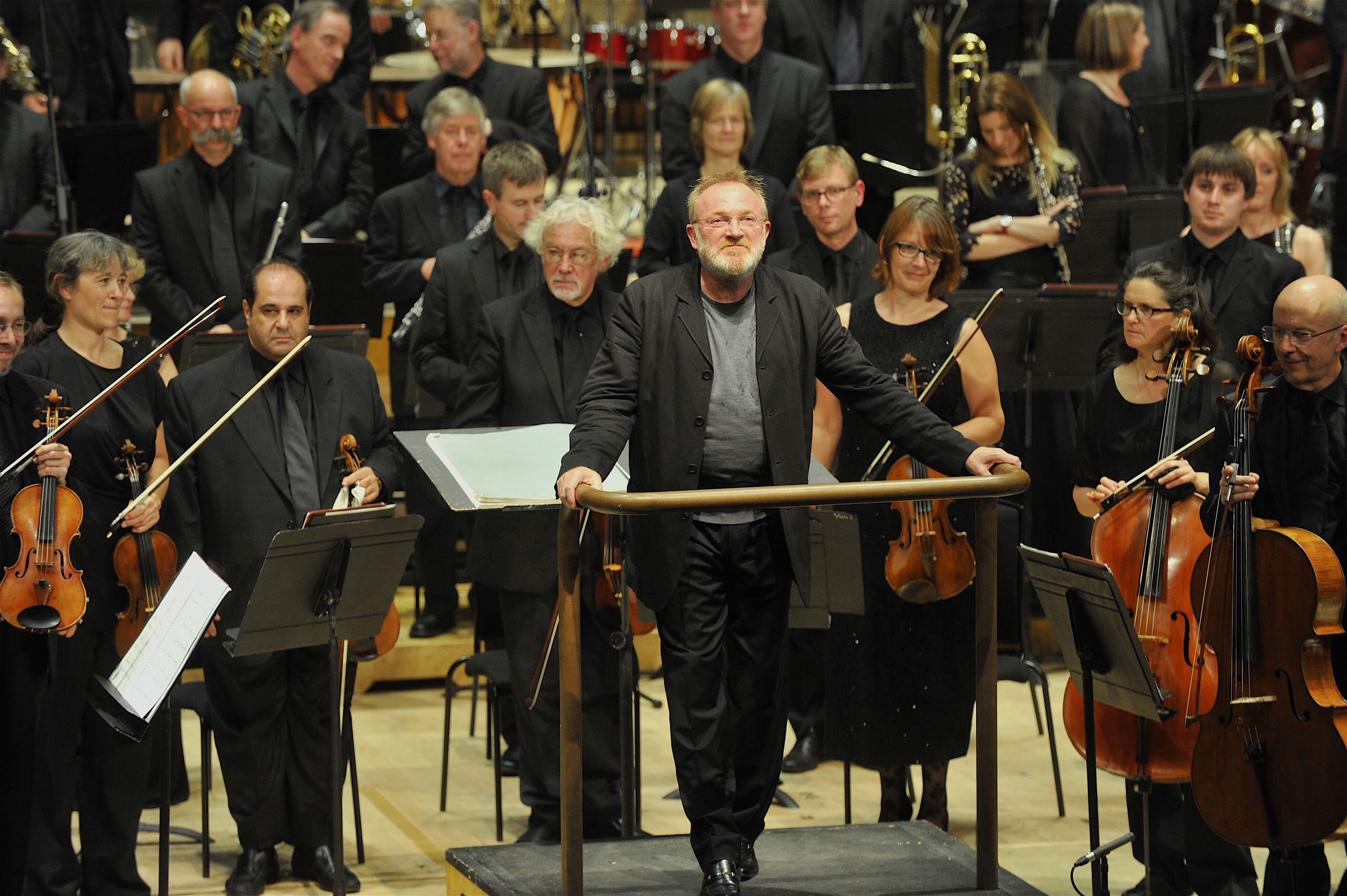BBCSO, Brabbins, Barbican review - commanding vistas of earth and sea | reviews, news & interviews
BBCSO, Brabbins, Barbican review - commanding vistas of earth and sea
BBCSO, Brabbins, Barbican review - commanding vistas of earth and sea
Inspired coupling of works by Birwistle and Vaughan Williams, both superlatively done

Dances of earth and songs of sea – the BBC Symphony Orchestra's latest programme offered an inspired coupling, where similar inspirations balanced contrasting styles.
Birtwistle (pictured below) composed Earth Dances in 1985-86, one of a series of large-scale works in which smaller projects – in this case the ensemble piece Secret Theatre – were expanded onto broad orchestral canvases. It calls for a huge orchestra, with a particularly large percussion section, the six percussionists continuously active throughout. Textures are built from "cantus" and "continuum" lines, the former long, sustained figures, typically in the strings, the latter more brittle and angular music, typically in the percussion. The music gradually evolves, evoking a sense of landscape through its vast linear expanses.
There is an earthiness too in the dry, bass-heavy textures, like the two tubas at the start, rumbling in their lowest register in dissonant counterpoint, and later from the two harps, similarly subdued at the bottom of their range. The performance here was ideal, carefully paced by Brabbins – steady, but never sluggish, the colours and pace gradually changing and occasionally switching in an instant. Dark, earthy colours from the woodwind section also added atmosphere and detail. An ensemble tour-de-force, and particularly impressive for the focused concentration from the orchestra, maintaining the precise textures throughout. An extended interval was required to move out Birtwistle’s percussion and make space for the BBC Symphony Chorus, who, with the orchestra, filled the Barbican stage for the second half. The chorus has a central role in the Vaughan Williams Sea Symphony, and the singers are required to set the mood for each of the extended movements, the strident first, elegiac second, rhythmic third and valedictory finale, while all the time clearly intoning the lines of Walt Whitman. Fortunately, the BBC Symphony Chorus proved equal to the task, the ensemble often sounding far larger than the numbers present, and, most impressively, maintaining their ensemble even with the voice groups mixed along the benches.
An extended interval was required to move out Birtwistle’s percussion and make space for the BBC Symphony Chorus, who, with the orchestra, filled the Barbican stage for the second half. The chorus has a central role in the Vaughan Williams Sea Symphony, and the singers are required to set the mood for each of the extended movements, the strident first, elegiac second, rhythmic third and valedictory finale, while all the time clearly intoning the lines of Walt Whitman. Fortunately, the BBC Symphony Chorus proved equal to the task, the ensemble often sounding far larger than the numbers present, and, most impressively, maintaining their ensemble even with the voice groups mixed along the benches.
Fears that the orchestra had been brutalised by Birtwistle proved unfounded, and the players gave an atmospheric and idiomatic reading of Vaughan Williams’ lush, Romantic score. The string tone was particularly impressive, warm but clean, and always well balanced. Good interjections, too, from the brass and woodwind, the low woodwinds – bass clarinet, contrabassoon – a particularly important colour here, and always suitably prominent.
The soloists made a curious paring, Elizabeth Llewellyn a bravura lyric soprano, Marcus Farnsworth a more intimate and reserved baritone. But both had much to offer, giving emotive readings and bringing the texts to life. This is one of the very rare occasions where the vocal soloists do not dominate the work, and, for all the manifold beauties of the ensemble, it would have been great to hear more from them. The ever-versatile Brabbins (pictured above) proved as adept to Vaughan Williams as he did to Birtwistle. He was clearly living every note of this music, giving clear, incisive cues to the orchestra and mouthing the lines to the singers at each of their entries. As well as his accuracy and attention to detail, Brabbins also skilfully conveyed the atmosphere, often giving up the beat and just shaping the rolling waves of string sonority with his arms. As in the Birtwistle, this was music-making on a grand scale, with Brabbins projecting a sense of awe at the scope of Vaughan Williams’ conception. Brabbins and the BBC Symphony have a recording of Vaughan Williams Second Symphony out on the Hyperion label at the end of the month, the Sea Symphony is likely for follow. Both could be definitive accounts.
The ever-versatile Brabbins (pictured above) proved as adept to Vaughan Williams as he did to Birtwistle. He was clearly living every note of this music, giving clear, incisive cues to the orchestra and mouthing the lines to the singers at each of their entries. As well as his accuracy and attention to detail, Brabbins also skilfully conveyed the atmosphere, often giving up the beat and just shaping the rolling waves of string sonority with his arms. As in the Birtwistle, this was music-making on a grand scale, with Brabbins projecting a sense of awe at the scope of Vaughan Williams’ conception. Brabbins and the BBC Symphony have a recording of Vaughan Williams Second Symphony out on the Hyperion label at the end of the month, the Sea Symphony is likely for follow. Both could be definitive accounts.
- This concert was recorded for BBC Radio 3 for future broadcast
- Read more classical music reviews on theartsdesk
rating
Explore topics
Share this article
more Classical music
 Ridout, Włoszczowska, Crawford, Lai, Posner, Wigmore Hall review - electrifying teamwork
High-voltage Mozart and Schoenberg, blended Brahms, in a fascinating programme
Ridout, Włoszczowska, Crawford, Lai, Posner, Wigmore Hall review - electrifying teamwork
High-voltage Mozart and Schoenberg, blended Brahms, in a fascinating programme
 Sabine Devieilhe, Mathieu Pordoy, Wigmore Hall review - enchantment in Mozart and Strauss
Leading French soprano shines beyond diva excess
Sabine Devieilhe, Mathieu Pordoy, Wigmore Hall review - enchantment in Mozart and Strauss
Leading French soprano shines beyond diva excess
 Špaček, BBC Philharmonic, Bihlmaier, Bridgewater Hall, Manchester review - three flavours of Vienna
Close attention, careful balancing, flowing phrasing and clear contrast
Špaček, BBC Philharmonic, Bihlmaier, Bridgewater Hall, Manchester review - three flavours of Vienna
Close attention, careful balancing, flowing phrasing and clear contrast
 Watts, BBC Symphony Orchestra and Chorus, Bignamini, Barbican review - blazing French masterpieces
Poulenc’s Gloria and Berlioz’s 'Symphonie fantastique' on fire
Watts, BBC Symphony Orchestra and Chorus, Bignamini, Barbican review - blazing French masterpieces
Poulenc’s Gloria and Berlioz’s 'Symphonie fantastique' on fire
 Bell, Perahia, ASMF Chamber Ensemble, Wigmore Hall review - joy in teamwork
A great pianist re-emerges in Schumann, but Beamish and Mendelssohn take the palm
Bell, Perahia, ASMF Chamber Ensemble, Wigmore Hall review - joy in teamwork
A great pianist re-emerges in Schumann, but Beamish and Mendelssohn take the palm
 First Persons: composers Colin Alexander and Héloïse Werner on fantasy in guided improvisation
On five new works allowing an element of freedom in the performance
First Persons: composers Colin Alexander and Héloïse Werner on fantasy in guided improvisation
On five new works allowing an element of freedom in the performance
 First Person: Leeds Lieder Festival director and pianist Joseph Middleton on a beloved organisation back from the brink
Arts Council funding restored after the blow of 2023, new paths are being forged
First Person: Leeds Lieder Festival director and pianist Joseph Middleton on a beloved organisation back from the brink
Arts Council funding restored after the blow of 2023, new paths are being forged
 Classical CDs: Nymphs, magots and buckgoats
Epic symphonies, popular music from 17th century London and an engrossing tribute to a great Spanish pianist
Classical CDs: Nymphs, magots and buckgoats
Epic symphonies, popular music from 17th century London and an engrossing tribute to a great Spanish pianist
 Sheku Kanneh-Mason, Philharmonia Chorus, RPO, Petrenko, RFH review - poetic cello, blazing chorus
Atmospheric Elgar and Weinberg, but Rachmaninov's 'The Bells' takes the palm
Sheku Kanneh-Mason, Philharmonia Chorus, RPO, Petrenko, RFH review - poetic cello, blazing chorus
Atmospheric Elgar and Weinberg, but Rachmaninov's 'The Bells' takes the palm
 Daphnis et Chloé, Tenebrae, LSO, Pappano, Barbican review - lighting up Ravel’s ‘choreographic symphony’
All details outstanding in the lavish canvas of a giant masterpiece
Daphnis et Chloé, Tenebrae, LSO, Pappano, Barbican review - lighting up Ravel’s ‘choreographic symphony’
All details outstanding in the lavish canvas of a giant masterpiece
 Goldscheider, Spence, Britten Sinfonia, Milton Court review - heroic evening songs and a jolly horn ramble
Direct, cheerful new concerto by Huw Watkins, but the programme didn’t quite cohere
Goldscheider, Spence, Britten Sinfonia, Milton Court review - heroic evening songs and a jolly horn ramble
Direct, cheerful new concerto by Huw Watkins, but the programme didn’t quite cohere
 Marwood, Power, Watkins, Hallé, Adès, Bridgewater Hall, Manchester review - sonic adventure and luxuriance
Premiere of a mesmeric piece from composer Oliver Leith
Marwood, Power, Watkins, Hallé, Adès, Bridgewater Hall, Manchester review - sonic adventure and luxuriance
Premiere of a mesmeric piece from composer Oliver Leith

Add comment